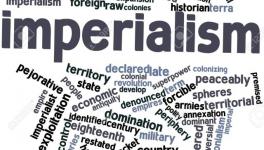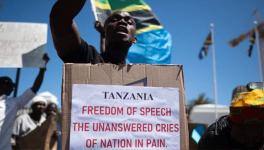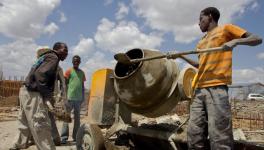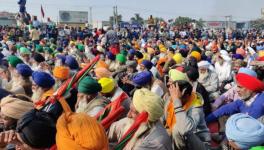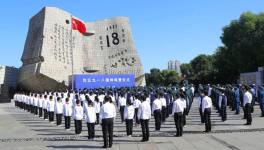Congolese People Proclaim: The Congo is Not For Sale!
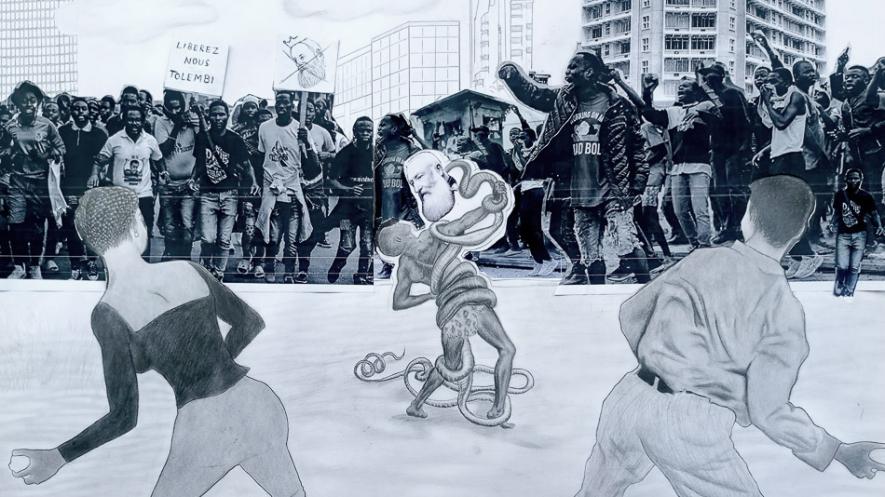
Soulèvement populaire et souveraineté (‘Popular Uprising and Sovereignty’), piece by Jardy Ndombasi via Tricontinental Institute for Social Research
The people of the Democratic Republic of the Congo continue to face paramilitary attacks against refugee camps and health centers, as the extraction of Congolese natural resources continues to produce unfettered conflict. Paramilitary conflict in the country has resulted in the displacement of seven million Congolese people, with more constantly forced to flee.
In light of the ongoing violence in the DRC, the Tricontinental: Institute for Social Research has published new dossier entitled, “The Congolese Fight for Their Own Wealth,” in recognition of the need for a better understanding of the colonial and imperial roots of resource extraction in the DRC, and the current fight against imperialism in the region.
For this analysis, Tricontinental collaborated with the Centre Culturel Andrée Blouin, the Centre for Research on the Congo-Kinshasa (CERECK), and Likambo Ya Mabele (Land Sovereignty Movement). Contributions were provided by Dr. Eyamba Bokamba, Dr. Georges Nzongola Ntalaja, Marie Claire Faray, Muadi Mukenge, Patricia Lokwa Servant, Lubangi Muniania, Kambale Musavuli, and Professor John Higginson.
Peoples Dispatch has interviewed Congolese human rights activists such as Kambale Musavuli, who in a 2022 interview outlined the connections between armed groups, backed by Rwanda, Uganda, and the West, to the extraction of the DRC’s mineral wealth. In describing M23, one of the paramilitary groups which has wreaked havoc across the country, “It is the same rebel force over twenty years, with the same soldiers and the same commanders, to serve the interests of Rwanda, which itself is a strong US ally in the so-called War on Terror. And what are Rwanda’s interests in the Congo—its land and its resources,” he said.
Early colonial plunder sets the stage
The new dossier by the Tricontinental: Institute for Social Research traces the current plight of the Congolese people back to the roots of colonialism, beginning with the 1876 Brussels Geographical Conference held by King Leopold II of Belgium, which was established with the true aim of creating the Comité d’études du Haut-Congo (‘Committee for Studies of the Upper Congo’) in 1878 and later the Association internationale du Congo (‘International Association of the Congo’ or AIC) in 1879. At the infamous Berlin Conference which took place only a few years later, the entire continent of Africa was divided up between the European powers, with Leopold forming the “Congo Free State” or CFS.
The early colonial history of the Congo is written in blood, as Congolese people were massacred and mutilated in the name of resource extraction for Belgium.
“Millions of Africans in the Congo across a broad spectrum of ethnic groups endured a sustained attack on their previous way of life alongside a state of violence animated by the CFS’s demands for rubber and other commodities needed to fuel the Industrial Revolution,” details the dossier. “Many had their hands and feet severed (with 1,308 severed hands brought to the colonial commissioner in one day alone), were killed by more advanced weaponry (such as the Maxim gun), and suffered systematic raids and village burnings.”
In the span of decades, the Congolese people were brutalized in the name of groundnuts, palm oil, rubber, and ore.
Congolese people resist colonialism
The dossier details not only the horror of the Western colonial regime, but also the resistance of the Congolese. “From 1900 to 1905, local groups launched attacks on colonial stations and plantations and seized Luebo, the rubber-rich capital of the Kasai region, from the colonizing forces,” writes the Tricontinental. “In 1915, a grassroots spiritual movement led by Maria N’koi combined traditional medicine and armed upheaval to oppose colonial taxation and refuse forced labor in the southern Congo.”
Into the 20th century, an African working class began to emerge, which brought a new terrain of struggle. In 1941, African mining workers went on strike across the Katanga province. One strike leader reflected the heightened class consciousness of the workers, saying, “We have the right to eat eggs and own automobiles just like the whites. Let us break into the store and divide up the stock. It belongs to us anyway, since the Union Minière has bought these goods with our labor.” The wave of strikes eventually spread to Congolese soldiers, escalating the struggle into a mutiny.
Although the colonial government cracked down on this groundswell of resistance, the struggles of the Congolese people fed into the demise of colonialism in the region. “Frustration with their unrealized demands fed into a stream of discontent that washed over the entire Congolese population during the closing years of World War II,” outlines the dossier. “The Belgian colonial state lost control of the countryside by 1957, and the mass urban uprisings on 4 January 1959 underscored Belgium’s waning grip on power over the urban working class.”
It was around this time that Patrice Lumumba emerged as a leader of the Congolese National Movement (MNC), at a time when the entire continent was in upheaval against its shackles of Western imperialism and resource extraction. In December 1958, Ghana’s Prime Minister Kwame Nkrumah hosted the All-African People’s Conference in Accra, which brought together leaders from throughout the continent.
Lumumba said at the conference, “The fundamental aim of our movement is to free the Congolese people from the colonialist regime and earn them their independence… [W]e have the same awareness, the same soul plunged day and night in anguish, the same anxious desire to make this continent a free and happy continent that has rid itself of unrest and of fear and of any sort of colonialist domination.”
The saga of Lumumba’s rise to the position of prime minister, the Belgian conceding of independence to the Congo in 1960, Lumumba’s downfall at the hands of the West and its puppets, and the creation of the Mobutu puppet regime are well-documented. Throughout this time of triumph and then defeat of the forces of decolonization, the Congolese people continued their resistance.
“During the uprisings against the Mobutu dictatorship in the 1960s led by Pierre Mulele, the rebels seized industrial towns like Kolwezi and then invited workers to form tribunals and identify managers and foremen who had brutalized them,” the dossier writes.
Neo-colonial plunder drives violence
The modern reality of the DRC continues to be one of violence resulting from unfettered resource extraction, exacerbated by the technological revolution. “By 2018, the DRC produced 71% of the cobalt used in cell phones, computers, and electric cars across the globe,” writes Tricontinental. Congolese miners as young as eight years old, barely compensated for their labor, dig with their hands in the earth of open-face mines to power the world’s electronics.
What is the vision of the Congolese people in the face of such violent extractivism? The dossier closes with words derived from young Congolese activists who highlight eight categories to building a path towards freedom.
Land, developing economic autonomy, society, state justice, dignity, critical thinking, the production and dissemination of culture, and citizenship collectives are the eight categories that are uplifted. In doing so, these young activists echo the spirit of Congolese decolonial resistance that has reverberated across decades.
“Congolese land must be protected and used with the best interests of the Congolese people in mind,” the dossier details. “Congolese resources must be controlled by the Congolese people with the aim of strengthening society and resisting the pressure of international financial institutions.”
Get the latest reports & analysis with people's perspective on Protests, movements & deep analytical videos, discussions of the current affairs in your Telegram app. Subscribe to NewsClick's Telegram channel & get Real-Time updates on stories, as they get published on our website.









